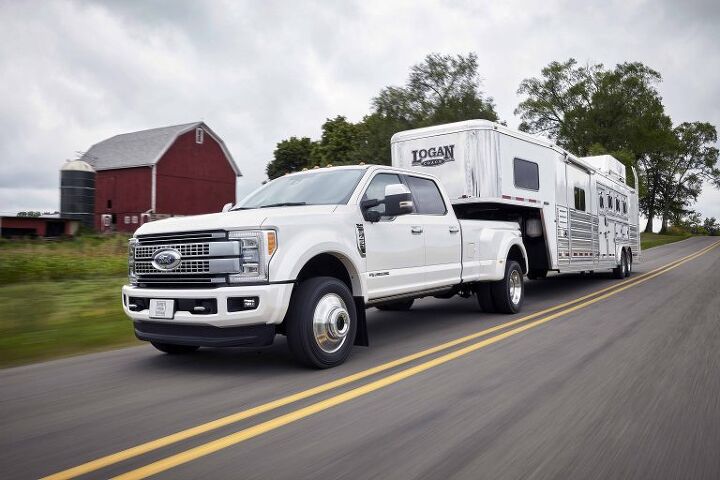Consumers Union Wants Heavy-duty Truck Buyers to Know Their Vehicle's Fuel Economy

Say you’re on the Ram website, perusing a new 2500 heavy-duty pickup. On the specifications page, you scroll down to the fuel efficiency table to see how many Andrew Jacksons you’ll be forking over at the pumps. The verdict? The Ram 2500 has a 32-gallon fuel tank. Thank you for visiting.
Unlike passenger cars and light duty trucks, heavy-duty trucks with a gross vehicle weight above 8,500 pounds aren’t required to flash fuel economy data on a window sticker. Searching the fueleconomy.gov database turns up nothing in the way of information. Now, Consumers Union wants Congress to change that. The consumer advocacy group is calling on the federal government to place fuel economy information on window stickers for the benefit of large truck buyers.
As it awaits a response, the group’s Consumer Reports publication went ahead and tested some heavy-duty pickups.
“Even though the Environmental Protection Agency collects data from automakers on heavy-duty pickup truck emissions and fuel economy, it has never mandated that the results be made available to the public, largely for budgetary reasons,” Consumer Reports states in the intro to its test.
The results of the tests, which differ from the EPA’s testing standard, aren’t shocking. The considerable heft of the brawny trucks impacts fuel economy when compared to smaller pickups, despite the inherent fuel-saving advantages of a diesel engine. Put through the paces were 2017 model year Chevrolet Silverado 2500HD, Ford F-250, and Ram 2500 trucks, plus the tweener Nissan Titan HD.
Unloaded, and with nothing hanging off the rear trailer hitch, the Silverado HD equipped with a 6.6-liter Duramax diesel V8 returned a combined 14 miles per gallon. That’s 2 mpg less than CR recorded in a 5.3-liter Silverado 1500.
The 6.7-liter diesel Ford F-250, also unencumbered with the things people buy heavy-duty trucks for, returned 15 mpg, or 2 mpg less than an F-150 equipped with a 2.7-liter Ecoboost V6. The 6.7-liter inline-six diesel Ram 2500 saw 14 mpg in the CR test, and the 5.0-liter diesel V8-powered Titan HD returned 15 mph. Naturally, these figures were lower than that of a light-duty pickup from the same brand.
Of course, most consumers are using heavy-duty trucks for heavy-duty work, and most aren’t likely to see such economy when towing that fifth-wheel or horse trailer or load of gravel. It’s because these trucks are usually, but increasingly less likely to be used for serious work that the EPA keeps the information to itself.
Currently, the information collected from the vehicles reflects the truck’s purpose. As such, heavy-duty trucks are rated in gallons per ton mile — the fuel consumed while transporting a ton of cargo one mile. City, highway, and combined figures do not apply, nor does the truck’s thirstiness while unladen.
Speaking to Automotive News, David Friedman, director of cars and product policy and analysis at Consumers Union, admitted that posting the results of the EPA test could be misleading for buyers.
“Everyone knows that the certification tests are pretty gentle and there’s a gap between real-world use,” Friedman said. “So, if, and when, they put out certification numbers, they will probably overestimate fuel economy. But we believe consumers are better off with some data than no data.”
Before the EPA and National Highway Traffic Safety Administration (NHTSA) move forward with the group’s request, if indeed the agencies ever plan to, extra funds are needed to bolster the necessary manpower, Consumers Union claims.
[Image: Ford Motor Company]

More by Steph Willems
Latest Car Reviews
Read moreLatest Product Reviews
Read moreRecent Comments
- DesertNative More 'Look at me! Look at me!' from Elon Musk. It's time to recognize that there's nothing to see here, folks and that this is just about pumping up the stock price. When there's a real product on the ground and available, then there will be something to which we can pay attention. Until then, ignore him.
- Bkojote Here's something you're bound to notice during ownership that won't come up in most reviews or test drives-Honda's Cruise Control system is terrible. Complete trash. While it has the ability to regulate speed if there's a car in front of you, if you're coasting down a long hill with nobody in front of you the car will keep gaining speed forcing you to hit the brakes (and disable cruise). It won't even use the CVT to engine brake, something every other manufacturer does. Toyota's system will downshift and maintain the set speed. The calibration on the ACC system Honda uses is also awful and clearly had minimum engineering effort.Here's another- those grille shutters get stuck the minute temperature drops below freezing meaning your engine goes into reduced power mode until you turn it off. The Rav4 may have them but I have yet to see this problem.
- Sobhuza Trooper "Toyota engineers have told us that they intentionally build their powertrains with longevity in mind."Boy, that's pretty hateful. I suppose some greedy people who would pick Toyota would also want to have greater longevity for themselves. But wouldn't we all rather die at 75, while still looking cool than live to be 85 and look like a doddering old man?
- Kwik_Shift_Pro4X Neither. They're basically the same vehicle.
- Analoggrotto 1. Kia Sportage2. Hyundai TucsonRugged SUVs which cater to the needs of the affluent middle class suburbanite which are second only to themselves, these are shining applications of Hyundai Kia Genesis commitment to automotive excellence. Evolving from the fabled Hyundai Excel of the 90s, a pioneering vehicle which rivaled then upstart Lexus in quality, comfort and features long before Hyundai became a towering king of analytics and funding legions of internet keyboard warriors.


































Comments
Join the conversation
I have an unmodified 2011 F250 Crew Cab 4x4 with the 6.7L. Unloaded on the highway I get 19 to 21 mpg. In my normal mixed driving commute I get 15 or 16 mpg. A couple of years ago we did a 21 day camping trip. About 4000 miles, most of it towing a 12,000 lb trailer. I averaged close to 10 mpg. Not too bad actually.
Seems unnecessary to me as well... sounds like a potential money-grab. Anyone buying a HD pickup KNOWS they're gonna get crappy mileage... & if they're interested in researching it prior to purchase, there are numerous forums where they can get an idea of REAL WORLD fuel economy. I have a 2016 Ram 2500 crew cab short bed 4x4 with the 6.4L hemi & 4.10s in the rear. On a recent camping trip to Mammoth, with a fully-loaded bed, two adults, and one VERY LARGE dog (110 lbs), I averaged right at 18 mpg... cruise set on 73 mph & outside temps around 108 degrees. No complaints here.